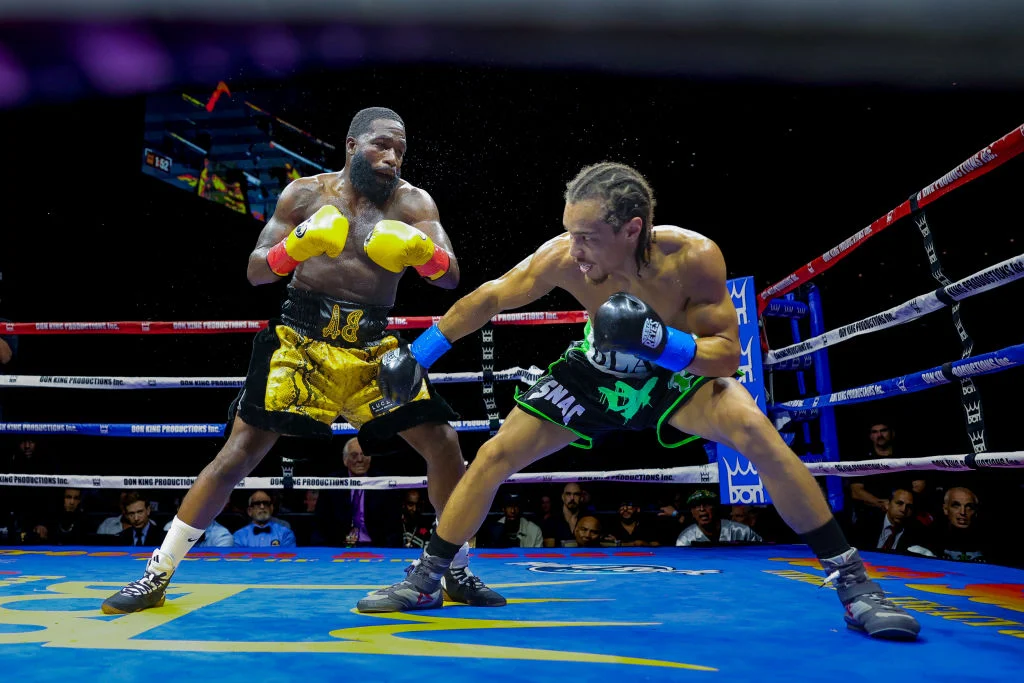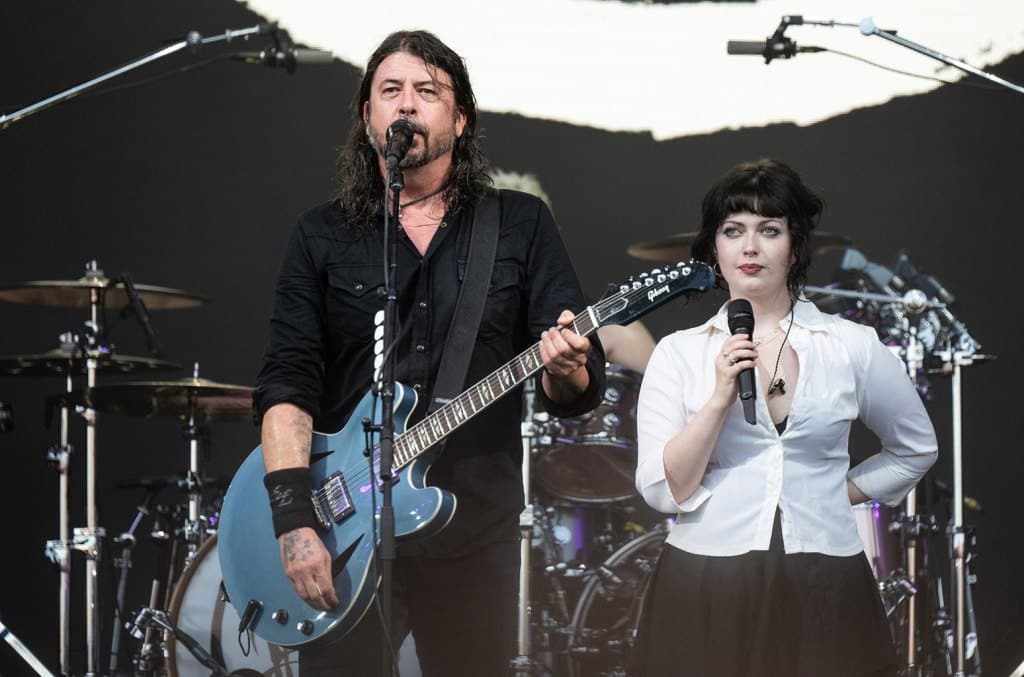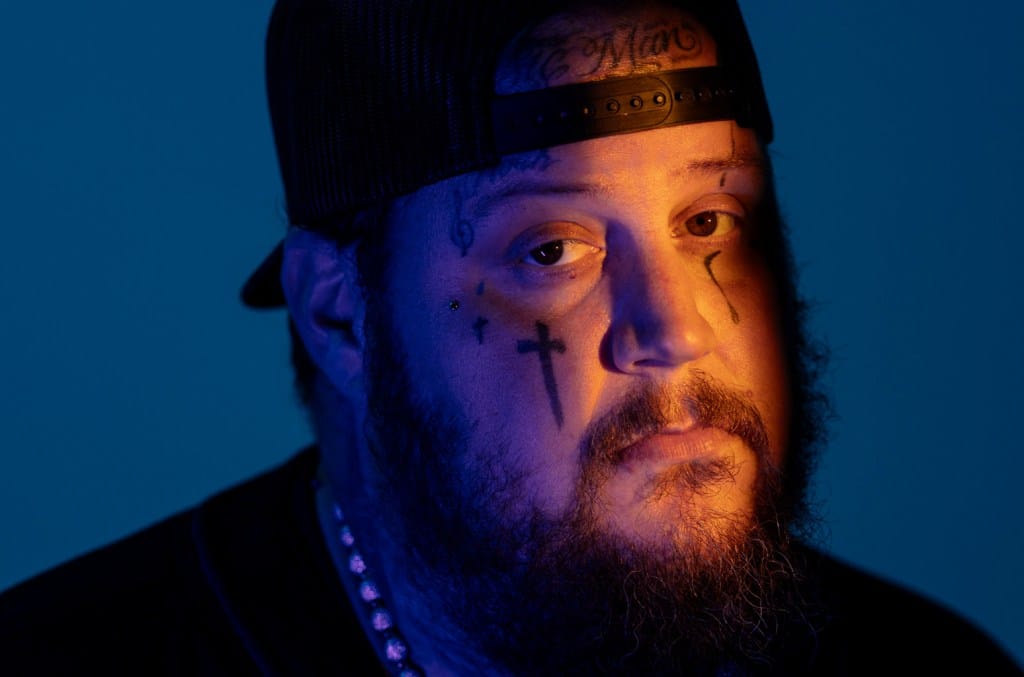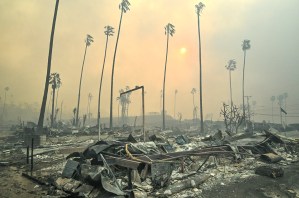Los Angeles
Page: 2
HipHopWired Featured Video
Source: Chris Arjoon / Getty
Adrien Broner, a boxer and former world champion whose career was marred by legal issues, found himself connected to the ongoing matter involving alleged gang leader Eugene “Big U” Henley. In the complaint filed against Big U, Adrien Broner was named in the document and allegedly used trick dice to rob NBA players of $6.5 million in a high-stakes gambling game.
As seen on Total Pro Sports, a user on X highlighted a portion of the federal complaint against Big U that centered on a 2019 dice game and a boxer with the initials “A.B.,” assumed here to be Adrien Broner. The document states that Broner, by way of a cooperating witness, was hosting the high-stakes celebrity dice game where the scheme unfolded.
In a Los Angeles Times report, the cooperating witness alerted authorities about the buy-in dice game that took place in June 2019. Broner and other unnamed individuals were in attendance with known NBA players. Henley became involved because Broner reportedly didn’t “check in” with him and ordered people in his alleged operation to physically harm Broner and return the stolen money from the trick dice.
The witness added that NBA players and other entertainers would need to alert Henley of their visits to make certain no harm would come their way and that any parties or event they attend would be safe to do so. Failure to check in with Henley resulted in retaliation from the alleged “Big U Enterprise.”
The Times added in its reporting that Henley personally confronted Broner after he stole $1.5 million from a current NBA All-Star player and cheated a former NBA All-Star out of $5 million. Authorities oversaw the meeting between Henley and one of Broner’s victims, and in this same meeting, said that he would charge $100,000 to get the money back for the duped NBA players.
Adrien Broner last fought in 2024, losing to Blair Cobbs.
—
Photo: Getty
HipHopWired Featured Video
Big U, an alleged top-ranking Rollin’ 60s Crips gang member and community activist, was arrested and charged with other individuals this week in connection to a RICO case. Big U, who was formerly connected to the late Nipsey Hussle, is accused of running a Mafia-like criminal enterprise by authorities, claims that U say are overblown due to Internet chatter.
In a report from the Los Angeles Times, Eugene “Big U” Henley, 58, was a massive influence on the Hip-Hop scene in Los Angeles, and his involvement with the gang world was notable considering he spent recent times as a community leader looking to quell violence on the streets. Now, Henley is facing charges of murder, kidnapping, robbery, and more.
As the Times notes, Big U was instrumental in boosting the career of Nipsey Hussle, who was also a member of the Rollin’ 60s. His connection with the music scene and his reported position in the Crips operation was framed by federal investigators as that of a mob boss with people visiting Los Angeles being required to “check in” with Henley to move untouched about the city. Henley is alleged to have put the “check in” requirement toward musicians and professional athletes alike.
In the 107-page federal complaint, officials say that Henley ran his self-styled enterprise similarly to how the Mafia operates, using his “stature and long-standing association with the Rollin’ 60s and other street gangs to intimidate businesses and individuals” across the city, according to the complaint.
When authorities first announced their intent to go after Henley, they named him a fugitive in a news conference but Henley eventually turned himself in. As reported by TMZ, Henley recorded a video ahead of turning himself in, stating that he’s done nothing wrong and has contributed heavily to his community. Over a dozen other individuals connected to Henley were also taken into custody.
U.S. Atty. Joseph T. McNally spoke at Wednesday’s news conference and said that Henley’s image as a music executive and community leader was false.
“[Henley] has maintained the image of an entertainment industry entrepreneur running a music label and of somebody who gives back to the community here in Los Angeles,” McNally said. “The facts alleged in the complaint paint a very different picture. It is one of a murderer, a thief, a liar and a cheat and the criminals that enabled him.”
Henley is accused of kidnapping and killing a young rapper and discarding his body in the Las Vegas desert. FBI investigators say that the hit was carried out due to disrespect and ordering a robbery of an unlicensed marijuana dispensary over unpaid extortion payments. Henley is also alleged to have taken charity donations from the likes of Shaquille O’Neal and Draymond Green, only to pocket the money for himself.
Sylvester Robinson, 59, allegedly Henley’s second-in-command, and alleged lieutenant Mark Martin, 50, are both accused of violating the Racketeer Influenced and Corrupt Organizations Act (RICO). Along with Henley, Termaine Williams, aka “Luce Cannon,” was charged with robbery, Armani Aflleje, aka “Mani,” was charged with transporting an individual to engage in prostitution, and Tiffany Hines was charged with bank fraud.
As seen in the videos above, Big U is claiming innocence.
—
Photo: Leon Bennett / Getty

In a new series following the devastating L.A. wildfires of January 2025, Billboard is speaking to impacted members of the music industry about their lives in the wake of the disaster. Affected music professionals who wish to take part in the series can email us at afterthefire@billboard.com.
This installment is with Iyana, an R&B singer, songwriter and instrumentalist who lost her Altadena apartment in the Eaton Fire.
I was at the recording studio when it happened. The power went out and [my neighbor] texted and invited me to over to hang with him and his lady and their dog.
Trending on Billboard
I wasn’t at home, so I said thank you and passed, and that was it for a few hours. I was doing my thing, hanging out with friends making music in Studio City, which is pretty far from my house. My neighbor checked on me again a few hours later and said “Don’t come back. We’re getting evacuated.” But I had my two cats at home, so I had to go back.
I texted another friend and told him we were getting evacuated and that I was having a lot of anxiety because of the cats at home. I don’t have a car, so he asked if I needed him to come pick me up so we could go rescue the cats. I told him I would love that. He drove all the way from downtown to Studio City to pick me up, then to Altadena.
This was hours after the evacuation notice had gone out, and the power was still off when I came home. It was pitch black and I had to wrangle my two cats. I was using my iPhone flashlight to see, and my brain was just mush. I didn’t really know how to process everything that was going on. I grabbed my laptop and a couple chargers, a little bit of cash that I had stashed away and that was about it. I was there for about 10 minutes.
I could see the fire from my window, but it looked far enough away that if they could get it under control, my place would be fine. I honestly did not think my place was going to burn down, so in my head I just kept telling myself it was going to be okay and that I’d be able to come back tomorrow. It was a crazy feeling to get a message from the property managers the next day telling me that the buildings were destroyed, knowing that I didn’t really get anything out of [my apartment.]
My mom passed away when I was younger, and I had a lot of her artwork and all the things I had left from her. Photos from my childhood, memorabilia from when I was a kid, things I thought I’d share with my future children one day. There were journals that I wanted to keep for my entire life to look back and see where I was at certain times. It’s all gone.
It’s been a lot to process. I feel like I’m doing pretty well accepting that it is what it is. I’m trying my best to practice non-attachment. This is a really huge lesson in non-attachment. It’s kind of crazy not to have anything, but’s a little bit liberating in some ways too, I suppose. I’m trying to see it from that perspective.
My friend who came with me to grab the cats is also a producer, so in the immediate aftermath I went with him to the recording studio and spent two nights there. It wasn’t the most comfortable situation, but I was able to have my cats there, which was really nice. It was a safe place for me to be for a couple of days.
A friend of mine called the next day and asked what I needed. It was just like, “I don’t know what I need. I’m having so many emotions that I can hardly think.” She asked, “Do you need underwear? Do you need toothpaste?” I was like, “Oh my gosh, yes. I actually do need underwear.” These were things that I wasn’t thinking about right after it happened, because I was honestly still in a state of shock. I needed other people to use their brain for me.
I also had a friend who told me I should start a GoFundMe. It’s been helpful. I’m still not sure about insurance, because the insurance company has been wishy-washy and trying to play games with us a bit. Even the FEMA thing, [they said] the National Guard was blocking my area for so long that FEMA wasn’t able to get proof or something. A lot of people have donated stuff to me. I got some clothes and the things I need for hygiene and whatnot. I’m pretty much living out of two suitcases and a duffel bag. I have a friend who’s in India for the month, and she’s letting me stay in her place while she’s gone. Another friend took my cats and she’s willing to [house them] as long as I need her to.
I’ve had a couple studio sessions since it happened, and it’s been really helpful for me to be in the studio and create, just because everything’s so crazy. It gives me a sense of normalcy or just allows me to have a moment of therapy.
I had a whole release schedule before this happened, a whole plan of what I was going to be doing for quarter one, two and three and the singles and projects I was going to release. I love writing love songs, but it feels weird too, because my house just burned down, and then I am going to drop a love song? It just didn’t feel right, so it felt nice to write a song about the situation. I think that will probably be the next song I share with the world.
It’s crazy too, because I’d released a song the day before the fire. I was also planning on this month being a marketing and promotion month for me, but I haven’t really been able to do any promo. It just doesn’t feel right to be like, “Hey guys, listen to my new song” while this is all going on. Instead, it’s been a whirlwind of trying to readjust and figure out how I go back to having a normal life… I typically work at a restaurant, but luckily the donations I’ve gotten are keeping me afloat for now, because to be honest, the idea of smiling in people’s faces and asking them what they want to eat for dinner just does not feel like mentally where I’m at right now.
I feel like I’ve seen this narrative on the internet, from people who aren’t from here and think this only happened to rich people and celebrities, which is silly… If people have the capacity to donate monetarily, that’s helpful for me right now, just in terms of rebuilding.
If people don’t have that capacity, I would love for people to tap into my music and see what I’m doing. It’s hard for me to imagine going back to a regular life after this. Theoretically, it’d be so nice if my music moved and did some numbers. It’s definitely my dream to be able to make money and start a life with music being the foundation, so having people support me on my journey and see my growth would be more than I could ask for. If people are willing to listen to my tunes and share them, that would warm my heart.

With a lineup of 27 legendary acts across two venues to raise money for wildfire victims and rebuilding efforts, Thursday night’s FireAid benefit concert was poised to be an epic night. But what transpired at the Kia Forum and Intuit Dome in Inglewood, California, turned out to be even more historic than anyone could have […]
In 2014, when Nirvana was being inducted into the Rock & Roll Hall of Fame, surviving members Dave Grohl, Krist Novoselic and Pat Smear reunited onstage to perform a raucous selection of the culture-shifting grunge band’s beloved songs. With Kurt Cobain gone, lead vocals fell to an assortment of guest singers – St. Vincent, Joan […]
Although Katy Perry is best-known for frothy, off-the-walls pop music, the Billboard Hot 100 topper opened her Thursday (Jan. 30) night mini-set during the FireAid LA Benefit Concert with a very different type of energy. Backed by a somber choir providing harrowing backup vocals, Perry belted out her resilience anthem “Rise,” a hit song featured […]

On Thursday (Jan. 30) night, The Black Crowes joined an all-star lineup of rock, pop, R&B, soul, country and hip-hop luminaries with the aim of raising money for those in need following the devastating wildfires that ripped through Los Angeles earlier this month. Befitting a city as sprawling and expansive as Los Angeles, the FireAid […]
Jelly Roll will play a headlining benefit show to support first responders who have bravely faced the wildfires that ravaged parts of greater Los Angeles earlier this month. The “I Am Not Okay” hitmaker will lead the benefit concert on Saturday at the Rose Bowl in Pasadena, California, and is inviting only first responders and […]
Anxious by nature, Matthew Willems has always been a planner. Founder of the electronic music label Perfect Driver and an engineer, DJ and producer who makes music as Matthew Anthony, Willems spent much of Monday, Jan. 6 at his apartment window. There he observed the strong, strange wind howling through Altadena, the eastern Los Angeles neighborhood where he and his girlfriend, Nicole Perkins, had lived for years.
Between the wind and lack of rain, Willems was uneasy. By 4 p.m. on Tuesday, he and Perkins packed go-bags with items including birth certificates, laptops and USB drives containing the source files for every track he’s ever produced and positioned them at the door of their one-bedroom apartment. At 6:50 p.m., they got the update Willems had been fearing.
“My friend who lives a mile down the hill said, ‘Dude, get out of your house immediately. The sky above it is red. I can see flames,’” he recalls.
Trending on Billboard
A minute later, the couple and their dog, a pittie mix named Honey, were driving away. On the road they passed six fire trucks heading into the neighborhood, the sirens and wind creating an urgent duet. An hour later, they’d made it to a friend’s house across town in Venice, at which point their phones blasted the emergency alert to evacuate Altadena. By the next morning, their entire neighborhood — the hardware store, the dive bar, the restaurants and houses, including their own — was destroyed.
“It was like a plane crashed, or a bomb went off, or like we were attacked in an active war zone,” Willems says of the scene he witnessed after he crossed police barricades and went to assess the damage on the evening of Jan. 8. As he left that night, he saw the president’s motorcade entering his neighborhood to tour the devastation.
Willems, like so many others in Los Angeles this month, lost everything: clothing, keepsakes and all his studio equipment. At the same time, thousands of residents of Pacific Palisades and Malibu were fleeing their own homes as another monster inferno devoured city blocks. And his story is an all-too-familiar one across the city, as the fires continue raging into their second week with definite end, much less a timeline to repair the damage or rebuild.
On Jan. 11, California Governor Gavin Newsom told Meet the Press that these fires will likely be considered one of the worst natural disasters in United States history. At least 27 people and countless animals died and approximately 12,300 structures were damaged or destroyed, to the cost of an estimated $250 billion so far. These numbers are stunning. They also do little to fully relay the feelings of panic, shock and devastation permeating Los Angeles during a week when ash rained even on parts of the city that weren’t actively aflame.
Like many other groups in Los Angeles, the city’s music community has been hit hard, and is suffering. A widely circulated spreadsheet of music industry professionals who have lost their homes contains more than 360 names — of musicians, publicists, engineers, studio techs, podcast hosts, photographers, record executives and more, along with numbers tallying respective spouses, children and pets. The list includes legendary producer Bob Clearmountain, Griffin Goldsmith of the band Dawes, the musician Poolside and many others, both well-known and rank-and-file industry members; many entries include GoFundMe links, as people search for ways to try to rebuild at least some semblance of the lives they led before the flames.
“Every piece of gear. Every guitar. Every flier I saved. Every record I dug for years and years. It’s all gone in an instant,” Poolside, whose real name is Jeffrey Paradise, wrote on Instagram while sharing videos of his smoldering home.
Some are finding solace in a determination to be helpful to those in need, and both the music community and the general population have taken quick action to support survivors. Within hours of the first fires, a dizzying number of volunteer opportunities were created to provide shelter, food, clothing and other support. The operators of Zebulon, an independent venue in the city’s Frogtown neighborhood, have transformed the space into a donation hub where volunteers have spent days accepting and sorting clothing, diapers, sleeping bags and other necessities. Guitar Center’s non-profit Music Foundation is helping musicians replace lost instruments, while We Are Moving the Needle is offering micro-grants to early and mid-career creators.
Outside of official organizations, a quick scroll through Instagram after the fires first broke out found individuals offering services ranging from free acupuncture to sketches of the homes people lost.
“The response has been immediate,” says Alejandro Cohen, director of music content at the city’s globally influential NPR affiliate, KCRW. “It’s been heartwarming to see the outpouring of support in the form of something as simple as saying, ‘I’m here thinking of you,’ to financial donations, to material donations in the form of instruments or in the form of saying, ‘I have a recording studio. Do you want to come and finish the job you were working on?’ Any form of support you can imagine, everyone is offering it up.”
The station itself is serving the community by quickly building a robust online resource hub for how to get and give support, along with, Cohen says, just “sharing the music that provides comfort, companionship and sometimes even just a way to escape for a moment.”
The fires have upended the city’s event schedule and rippled through the music industry at large. The Weeknd cancelled his Jan. 25 show at the Rose Bowl and postponed the release of a new album, while Beyoncé postponed an announcement scheduled for Jan. 14. Many shows have been cancelled or postponed, with others shifting gears to become fundraisers. Meanwhile many large and small-scale benefits by a genre-spanning collection of artists and promoters will happen throughout the city in the coming weeks.
A Jan. 8 photo of a mobile home park that destroyed during the Palisades Fire.
Jeff Gritchen/MediaNews Group/Orange County Register/Getty Images
On Jan. 13, while firefighters were still working to contain the Palisades and Eaton Canyon fires, the Recording Academy announced the Grammy Awards ceremony will still happen on Feb. 2 at Los Angeles’ Crypto.com Arena, along with myriad related events such as the annual MusiCares fundraiser, which will raise funds for relief efforts. (Amid some backlash, the statement by the Academy stressed that all of the events “will have a fundraising element.”) MusiCares tells Billboard that it has already received more than 2,000 requests for assistance from music professionals affected by the fires, with the volume of need exceeding $4 million.
Universal, BMG, Sony and Warner, among other music companies including Billboard, subsequently cancelled their parties and events around the ceremony, with some of the money used to host these parties being diverted to fire aid support. Meanwhile, artists including Metallica, the Eagles, Doja Cat and Beyoncé have pledged millions to help support victims, as have corporations like Amazon, YouTube, Netflix and more.
But so far, Willems says the only immediate assistance he’s received has been from his GoFundMe. The day after his home was destroyed, he spent three hours on the phone with FEMA trying to access a $770 grant the organization is offering to fire victims; FEMA’s support team ultimately wasn’t able to provide the money. Willems says his email to MusiCares has not yet been answered, given the sheer volume of requests for assistance.
“Our team is working tirelessly to process these requests with the utmost care and urgency,” says Laura Segura, executive director of MusiCares. “Each individual’s request is carefully reviewed to ensure effective and equitable support is provided. For those with more significant needs — such as individuals experiencing medical challenges, the loss of essential music equipment, or longer-term displacement — we are conducting additional follow-ups to offer tailored assistance.”
“The minute I heard the apartment was gone I wrote copy [for my GoFundMe], found a compelling image then emailed the fundraiser to my music friends,” says Willems. “That’s the real community backing me up.” Willems has thus far been offered help by headliner level DJs he’s never spoken to before, along with many fellow artists and industry professionals who are sending money, helping him and his girlfriend find a new place to live and just checking in daily to make sure they’re okay.
Among the many things Willems lost in the fire was a jacket he got while working at electronic digital download platform Beatport. “I was really proud of that coat,” he says. “The someone else who works there was like, ‘Hey man, you can have mine.’ So now I own one coat.”
He calls such acts of kindness stabilizing in a deeply stressful and uncertain moment, when he and others have lost their homes, all their belongings and the sense of safety created by these things. Many of these people have reported bumping into price gouging as they re-enter the city’s already expensive rental market. Willems, like many others, observed looters rooting through burned down homes in Altadena before the fire was even out. He says he and Perkins will not be returning to the neighborhood, largely due to concerns about air quality during the coming cleanup.
“It’s not a day, and it’s not a week,” says Willems. “This is a recovery that’s going to take us years. We haven’t stood in front of our apartment to have a good cry. We haven’t had a chance yet. We’re too busy trying to not get f–ked.”
For more information or to apply for support, contact MusiCares at MusiCaresRelief@musicares.org or call 1-800-687-4227. To donate, visit musicares.org/firerelief.
HipHopWired Featured Video
Kid Cudi was the victim of a home burglary that went on a little longer than it should have after the perpetrator was caught making himself a bit too comfortable and was eventually caught. The man was seen on Kid Cudi’s security system having a meal, a shower, and even using the bathroom before authorities nabbed him.
TMZ reports that the Los Angeles home of Kid Cudi, real name Scott Mescudi, was burglarized this week, with footage from Wednesday (Jan. 15) showing the shirtless man using the shower, having a meal, relieving himself, and generally enjoying the fruits of Cudi’s labor tax-free. Police arrived at the home around 5 PM local time and took the unidentified suspect into custody without incident.
Cudder wasn’t home when the crime took place so thankfully he was unharmed. It wasn’t listed in the report if any items from the home were stolen or if the man was just making a much-needed pit stop being going about his day. As the outlet notes, the breaking and entering came with a high ticket of. felony burglary and theft of utilities along with being held behind bars on $150,000 bail.
Cudi has been busy on both the acting and music front with his role in the Knuckles series starring Idris Elba, along with a role in M. Night Shyamalan’s Trap film. Cudi also released his two studio albums, Isano and Insano (Nitro Mega).
So far, Kid Cudi hasn’t made a public statement about the crime or the arrest.
—
Photo: Getty

 State Champ Radio
State Champ Radio 







